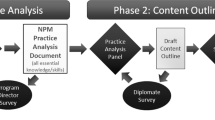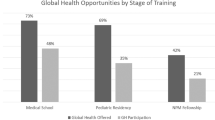Abstract
Objective:
To assess candidate neonatology EPAs taken from separate but overlapping sets from two organizations.
Study design:
Using a Delphi process, we asked that neonatology fellowship directors (1) assess importance and scope of 19 candidate EPAs, and (2) propose additional EPAs if necessary. In round 2, we sought clarification of first round responses and evaluated proposed additional EPAs.
Results:
Twenty program directors participated. In round 1, all EPAs were scored as important, but four were overly broad. In round 2, respondents rejected proposed subdivisions of one overly broad EPA, retaining it as originally proposed. Specification of entrustment criteria improved the scope of the three other broad EPAs. However, after specification, they were re-rated as insufficiently important and therefore rejected. Neither newly proposed EPA from round 1 was rated as sufficiently important.
Conclusion:
The Delphi process yielded 13 EPAs with which to assess capability to practice clinical neonatology.
This is a preview of subscription content, access via your institution
Access options
Subscribe to this journal
Receive 12 print issues and online access
$259.00 per year
only $21.58 per issue
Buy this article
- Purchase on Springer Link
- Instant access to full article PDF
Prices may be subject to local taxes which are calculated during checkout


Similar content being viewed by others
References
Carraccio C, Wolfstahl SD, Englander R, Ferentz K, Martin C . Shifting paradigms: from Flexner to competencies. Acad Med 2002; 77: 361–367.
Hawkins RE, Welcher CM, Holmboe ES, Kirk LM, Norcini JJ, Simons KB et al. Implementation of competency-based medical education: are we addressing the concerns and challenges? Med Educ 2015; 49: 1086–1102.
Englander R, Carraccio C . From theory to practice: making entrustable professional activities come to life in the context of milestones. Acad Med 2014; 89: 1321–1323.
Huddle TS, Heudebert GR . Taking apart the art: the risk of anatomizing clinical competence. Acad Med 2007; 82: 536–541.
Lurie SJ . History and practice of competency-based assessment. Med Educ 2012; 46: 49–57.
ten Cate O . Entrustability of professional activities and competency-based training. Med Educ 2005; 39: 1176–1177.
ten Cate O, Scheele F . Competency-based postgraduate training: can we bridge the gap between theory and clinical practice? Acad Med 2007; 82: 542–547.
ten Cate O, Chen HC, Hoff RG, Peters H, Bok H, van der Schaaf M . Curriculum development for the workplace using entrustable professional activities (EPAs): AAME guide no. 99. Med Teach 2015; 37 (11): 983–1002.
Warm EJ, Mathis BR, Held JD, Pai S, Tolentino J, Ashbrook L et al. Entrustment and mapping of observable practice activities for resident assessment. J Gen Intern Med 2014; 29 (8): 1177–1182.
Jones MD Jr, Rosenberg AA, Gilhooly JT, Carraccio CA . Competencies, outcomes, and controversy—linking professional activities to competencies to improve resident education and practice. Acad Med 2011; 86: 161–165.
American Board of Pediatrics. Entrustable professional activities for subspecialties: neonatology. Available at https://www.abp.org/subspecialty-epas#Neonatology(accessed 6 July 2016.)
American Academy of Pediatrics. United States Neonatal-Perinatal Training Program Centers, 2012. Available at https://www2.aap.org/sections/perinatal/pdf/ONTPDDirectory12.pdf(accessed 12 March 2017.)
de Villiers MR, de Villiers PJT, Kent AP . The Delphi technique in health sciences education research. Med Teach 2005; 27 (7): 239–643.
Rowe G, Wright G, Bolger F . Delphi—a reevaluation of research and theory. Technol Forecast Soc Change 1991; 39: 235–251.
Rowe G, Wright G . The Delphi technique as a forecasting tool: issues and analysis. Int J Forecast 1999; 15: 353–375.
Diamond IR, Grant RC, Feldman BM, Pencharz PB, Ling SC, Moore AM et al. Defining consensus: a systematic review recommends methodologic criteria for reporting of Delphi studies. J Clin Epidemiol 2013; 67: 401–409.
Boyce P, Spratt C, Davies M, McEvoy P . Using entrustable professional activities to guide curriculum development in psychiatry training. BMC Med Educ 2011; 11: 96.
Shaughnessy AF, Sparks J, Cohen-Osher M, Goodell KH, Sawin GL, Gravel J Jr . Entrustable professional activities in family medicine. J Grad Med Ed 2013; 5: 112–118.
Hauer KE, Kohlwes J, Cornett P, Hollander H, ten Cate O, Ranji SR et al. Identifying entrustable professional activities in internal medicine. JGME 2013; 5: 54–59.
Rose S, Fix OK, Shah BJ, Jones TN, Szyjkowski RD . Entrustable professional activities for gastroenterology fellowship training. Gastroenterology 2014; 147: 233–242.
Leipzig RM, Sauvigne K, Granville LJ, Harper GM, Kirk LM, Levine SA et al. What is a geriatrician? Ameican Geriatric Society and Association of Directors of Geriatrics Academic Programs end-of-training entrustable professional activities for geriatric medicine. JGAS 2014; 62: 924–929.
Caverzagie KJ, Cooney TG, Hemmer PA, Berkowitz L . The development of entrustable professional activities for internal medicine residency training: a report from the education redesign committee of the Alliance for Academic Internal Medicine. Acad Med 2015; 90: 479–484.
Schultz K, Griffiths J, Lacasse M . The application of entrustable professional activities to inform competency decisions in a family medicine residency program. Acad Med 2015; 90 (7): 888–897.
Jonker G, Hoff RG, ten Cate O . A case for competency-based anaesthesiology training with entrustable professional activities. An agenda for development and research. Eur J Anaesthesiol 2015; 32: 71–76.
ten Cate O . Nuts and bolts of entrustable professional activities. J Grad Med Educ 2013; 5: 157–158.
Fessler HE, Addrizzo-Harris D, Beck JM, Buckley JD, Pastores SM, Piquette CA et al. Entrustable professional activities and curricular milestones for fellowship training in pulmonary and critical care medicine. Report of a multisociety working group. Chest 2014; 146 (3): 813–834.
Messick S . The interplay of evidence and consequences in the validation of performance assessments. Educ Res 1994; 23 (2): 13–23.
Downing SM . Validity: on meaningful interpretation of assessment data. Med Educ 2003; 37: 830–837.
Downing SM, Haladyna TM . Validity threats: overcoming interference with proposed interpretations of assessment data. Med Educ 2004; 38: 327–333.
Cook DA, Beckman TJ . Current concepts in validity and reliability for psychometric instruments: theory and application. Am J Med 2006; 119: 166.e7–16.
Newton PE . Clarifying the consensus definition of validity. Measurement 2012; 10 (1-2): 1–29.
Van Loon KA, Driessen EW, Teunissen PW, Scheele F . Experiences with EPAs, potential benefits and pitfalls. Med Teach 2014; 36: 698–702.
Carraccio C, Englander R, Holmboe ES, Kogan JR . Driving care quality: aligning trainee assessment and supervision through practical application of entrustable professional activities, competencies, and milestones. Acad Med 2016; 14 (2 Suppl): S38–S54.
ten Cate O . Entrustment decisions: bringing the patient into the assessment equation. Acad Med 2017; 92 (6): 736–738.
Okoli C, Pawlowski SD . The Delphi method as a research tool: an example, design considerations and applications. Inf Manag 2004; 42: 15–29.
Acknowledgements
The authors thank the members of ONTPD for participation in this study and Jennifer Gong for her help in the preparation of this manuscript.
Author information
Authors and Affiliations
Corresponding author
Ethics declarations
Competing interests
The authors declare no conflict of interest.
Rights and permissions
About this article
Cite this article
Parker, T., Guiton, G. & Jones, M. Choosing entrustable professional activities for neonatology: a Delphi study. J Perinatol 37, 1335–1340 (2017). https://doi.org/10.1038/jp.2017.144
Received:
Revised:
Accepted:
Published:
Issue Date:
DOI: https://doi.org/10.1038/jp.2017.144
This article is cited by
-
Part 5: Essentials of Neonatal-Perinatal Medicine Fellowship: evaluation of competence and proficiency using Milestones
Journal of Perinatology (2022)



